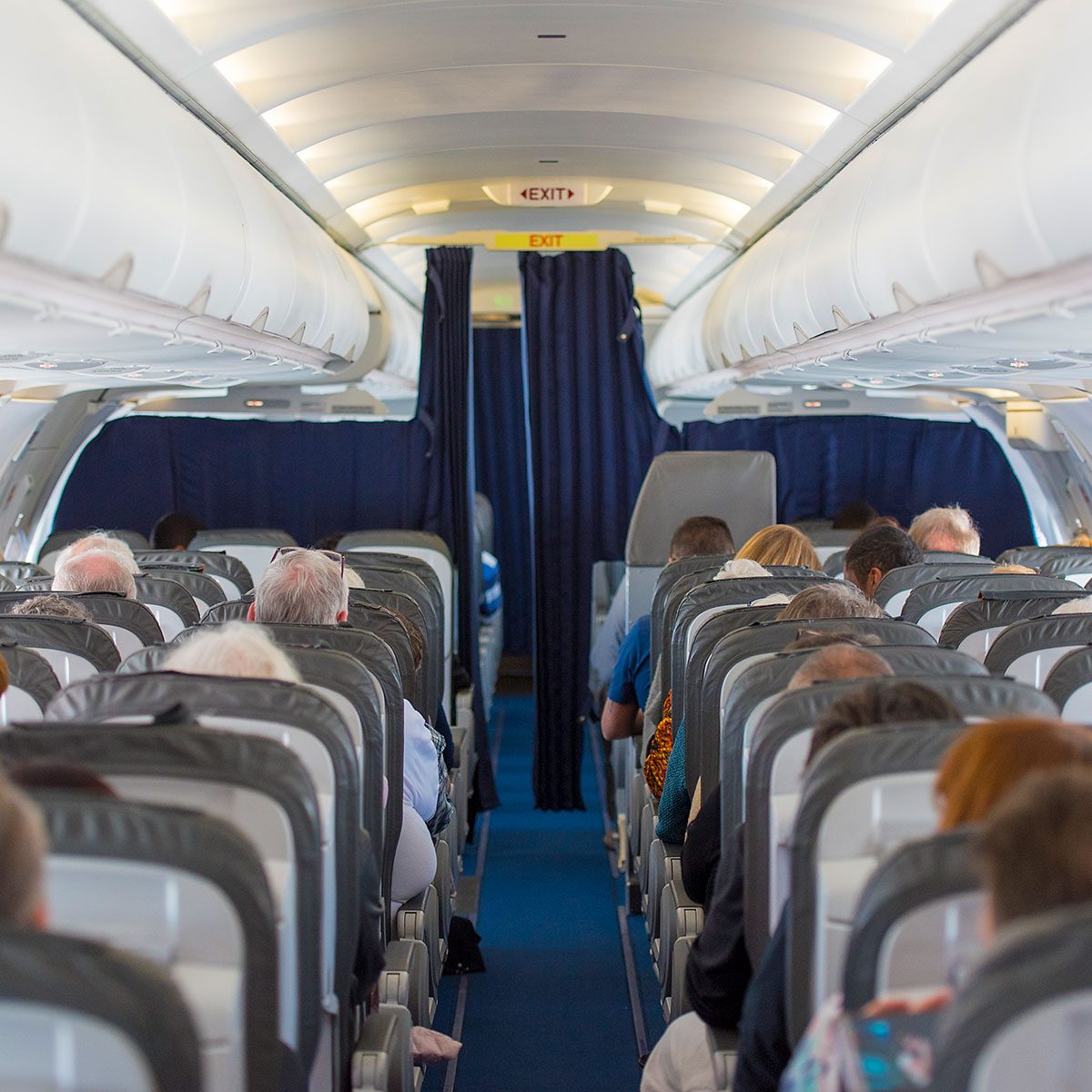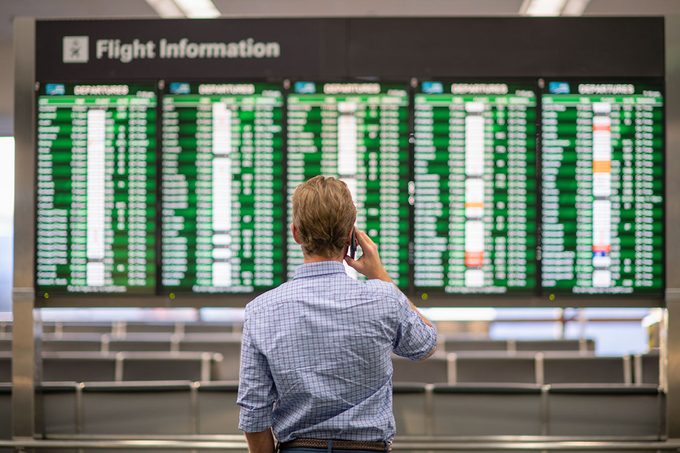Passengers dream of getting bumped to first class, but they rarely consider the nightmare of being involuntarily downgraded—until it happens to them. Here's how to handle it.

Here’s What to Do If You Get Downgraded on a Flight

Picture this: You have an exhausting long-haul flight ahead. But the good news is you’ve been planning for months and splurged on a business-class seat. Instead of getting pretzeled into a cramped spot in the back of the plane, you’ll be living the sky-high life in the front, sipping Champagne and stretching out in your own personal pod.
Now imagine arriving at the airport, only to have the gate agent hit you with a gut punch—you’ve been downgraded to economy. Worse, you’re now stuck in middle-seat purgatory. Sounds far-fetched? You may be surprised to know that seat downgrades like this happen more often than you’d think and for a variety of reasons. While airlines may have their justifications for seat switches, that doesn’t make the experience any less frustrating.
So what can you do? To find out, we asked a consumer attorney and two passengers-rights advocates for their best tips. Read on for advice on how to handle downgrade drama if it affects your next flight.
Get Reader’s Digest’s Read Up newsletter for more travel, tech, cleaning, humor and fun facts all week long.
What is an involuntary downgrade?
Frequent fliers know that volunteering to give up your seat can lead to a nice payday. I once scored $700 by swapping my oversold direct flight from Nashville to New York for a route with a quick layover that added only a couple hours to my trip. But involuntary seat downgrades—when a passenger pays for a certain class but gets bumped to a lower one—rarely come with a sweet deal. Worse, they’re almost always out of your control.
On a recent flight to Palm Springs, there was a last-minute aircraft swap due to technical issues that left some unlucky passengers involuntarily downgraded. I watched as one woman cycled through the five stages of grief—denial, anger, bargaining and depression—before finally landing on acceptance that there was essentially nothing she could do to make her plum seat assignment magically rematerialize.
Why might you be downgraded on a flight?
There are a number of reasons why you could be downgraded. Some are understandable, such as the above aircraft change that resulted in fewer available premium seats, while others can feel completely unfair.
Overbooking is one of the most common causes of involuntary downgrades. “To maximize revenue, airlines often sell more tickets than available seats,” explains Florida-based consumer attorney Danny Karon. “This ensures flights remain full even if some passengers cancel or miss their flights.”
Lyle Elkins, a former airline pilot and South Carolina–based aviation lawyer who founded the passenger-rights group Air Travel Advocates, notes that other common reasons for seat downgrades include broken seats or contract-crew rest provisions. Depending on the flight duration, accommodation issues and the aircraft type, he says an airline may need to block off some first-class seats to ensure “crew members have adequate rest to meet physical and regulatory requirements.”
What should you do if you’ve been downgraded?

When involuntarily downgraded, being proactive is key, and time is of the essence. If you receive early notice of a downgrade, it’s often due to equipment change, Elkins explains. In this case, you may be able to salvage your seat. “When you have advance notice, you can contact the airline to see whether you can switch to a different flight at the same level of service,” he says. “Airlines typically should be very accommodating to such requests since both the airline and a passenger’s needs are met, and both are content.”
When switching flights isn’t an option, Karon suggests writing a formal complaint to the airline, “demanding compensation for not giving you what you paid for.”
If you find out about the downgrade at the airport, there are still steps you can take to ensure you receive proper compensation. Paul Hudson, a public-interest advocate and the president of FlyersRights, recommends always getting explanations for the downgrade (and any compensation promises) in writing from the airline.
Karon advises documenting everything too: Take a photo of your new seat assignment, keep your boarding pass and retain any communication with airline representatives, including their names and positions. “You’ll need this information when making your claim for compensation,” he says.
In both cases, try to remedy the situation as quickly as possible. “Do not delay seeking compensation from the airline,” Elkins says. “The faster you seek compensation, the more the airline will be inclined to address the matter, since out of sight is out of mind.”
What are your rights?
According to the U.S. Department of Transportation (DOT), passengers are entitled to a refund “if the consumer was involuntarily moved to a lower class of service.” In a case where a first-class passenger is downgraded to economy because of an airplane swap, for example, the refund would be “the difference in fares,” the DOT states.
There’s more to your rights as a passenger: Karon explains that airlines must issue refunds “in cash or in the form of original payment used to make the purchase, such as credit card or airline miles.” It’s important to note, he adds, that airlines “may not substitute cash refunds with vouchers, travel credits or other forms of compensation unless the passenger chooses to accept alternative compensation.”
Elkins also emphasizes that passengers should ensure the fare refund is calculated based on the fare at the time of booking. “Unless,” he says, “it is to your financial advantage to do otherwise.”
Like Karon, Elkins encourages passengers to request the refund in cash but also advises them to negotiate for additional compensation, such as travel vouchers or frequent-flier miles. “Worst that can happen is a ‘no,'” he says.
He also suggests checking an airline’s contract of carriage (available on its website) for specific information on involuntary seat downgrades, since some carriers may offer more compensation than others.
How can you avoid downgrades?
While some downgrades are unavoidable, there are steps you can take to reduce the risk, such as booking flights far in advance and checking in as soon as possible in case a flight is oversold. Achieving a higher frequent-flier status is another smart tactic—airlines prioritize loyalty when it comes to deciding on downgrades.
Still, sometimes an involuntary seat change is just bad luck. “If it happens, the best response is to know your rights,” Karon says. “The airlines do their best, but sometimes they flub up.”
Maybe something like:
His advice when that happens? “Be patient and professional. Make a respectable ask in writing, and hope for the best,” Karon says. Don’t be snippy or rude—or threaten to sue the airline. But do something. “After all,” he says, “the squeaky wheel always gets the grease.”
About the experts
|
Why trust us
Reader’s Digest has published hundreds of travel stories that help readers explore the world safely, easily and affordably. We regularly cover topics such as the best places to visit (and the best times to visit them), tips and tricks to zoom through airport security, flight-attendant secrets, hotel-room hacks and more. We’re committed to producing high-quality content by writers with expertise and experience in their field in consultation with relevant, qualified experts. We rely on reputable primary sources, including government and professional organizations and academic institutions as well as our writers’ personal experiences where appropriate. We verify all facts and data, back them with credible sourcing and revisit them over time to ensure they remain accurate and up to date. For this piece, Aaron Rasmussen tapped his experience as a longtime travel writer and travel guidebook editor to ensure that all information is accurate and offers the best possible advice to readers. Read more about our team, our contributors and our editorial policies.
Sources:
- Danny Karon, consumer attorney and chair of the American Bar Association National Institute on Class Actions; email interview, February 2025
- Paul Hudson, president of FlyersRights; email interview, February 2025
- Lyle Elkins, former airline pilot, aviation lawyer and founder of Air Travel Advocates; email interview, February 2025
- U.S. Department of Transportation: “Am I Entitled to a Refund?”























